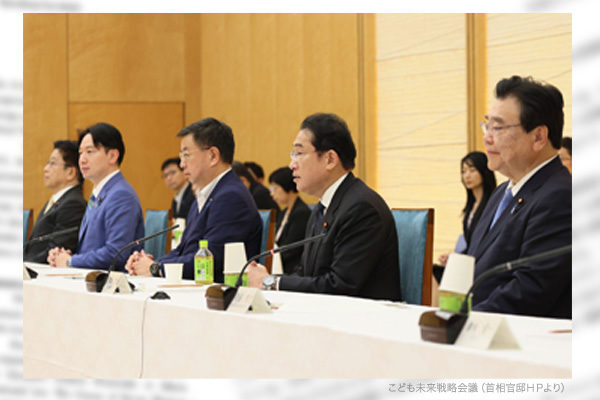On June 16, the Japanese cabinet approved the Basic Policy on Economic and Fiscal Management and Reform 2023, in which the government vowed to promote unprecedented countermeasures to the declining birthrate based on the earlier-adopted Children’s Future Strategy.
No recovery expected in reversing birthrate decline
The Strategy includes some measures that can be given positive ratings. It calls for eliminating income-based restrictions on child allowance, expanding child allowance coverage to include high school students and doubling the monthly allowance to 30,000 yen for third and subsequent children. There may be a view that the government should impose income-based restrictions on child allowance and use surplus financial resources emerging from such restrictions for supporting economically vulnerable people. In order to encourage high-income households to have more children, however, such restrictions should be eliminated. As for the expansion of child allowance coverage to include high school students, how to coordinate the child allowance measure with tax deduction for dependents aged 16 or more will become a challenge.
I would like to appreciate the government for expanding support for households having three or more children, as recommended by various groups over the years. But I doubt if the monthly allowance amount of 30,000 yen for third and subsequent children would resonate with young generations. To increase the impact, the government may need to raise the monthly allowance to 50,000 yen to allow third and subsequent children to get 10 million yen over 18 years before their graduation from high schools.
However, even if various measures cited in the Children’s Future Strategy are implemented with financial resources secured, it is unlikely that a recovery in the number of births or a halt to the decline in the total fertility rate will be realized. This is because many of the measures presented are not unprecedented and menus that add to the base of the accumulated measures against declining birthrates are lined up.
It goes without saying that support for balancing child-rearing and work, such as the development of child-rearing environments and the expansion of childcare leave systems, is important. However, while Japan has been implementing measures against declining birthrates based on balancing child-rearing and working practices for nearly 30 years, the number of births has decreased dramatically, and there has been no stop to the decline in the total fertility rate.
Furthermore, considering that the total fertility rate has declined sharply in recent years in Nordic countries, which have a high level of welfare and gender equality policies, it may be necessary for Japan to calmly reflect on the direction of countermeasures to the declining birthrate.
Support required for meeting and dating
In response to the situation in which young people cannot envision their future prospects for marriage and child-rearing, the Strategy places “increasing the income of young people” as the most important task. While this effort is essential, it is difficult to improve the trend of remaining unmarried with this alone. The most common reason for remaining single is “not having met a suitable partner yet,” and the reason “not being able to get along with the opposite sex” is also increasing rapidly.
The issue of balancing child-rearing and work is of high social interest, and the voices of those who are in a tight situation are easily heard as a desperate cry. However, as there are many who regard issues related to meeting and dating as a personal matter, the voices of those who are struggling with these issues are less likely to be heard. If the government has a strong will to reverse the declining birthrate, it may be required to listen to young people who have difficulties in meeting and dating.
Takeshi Kudo is an adjunct lecturer at the Faculty of Literature and Science, Nihon University, and a member of the Planning Committee, Japan Institute for National Fundamentals.


